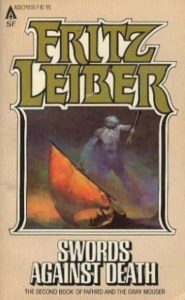The stories in Swords Against Death are among the first published adventures of Fafhrd and the Gray Mouser, making them more than 70 years old at this writing. The bulk of them were published as stand-alone stories in pulp magazines in the 1940s and 1950s; nearly all of them predate The Lord of the Rings, some by a decade and a half. If they seem simple, or sometimes clichéd, that’s likely because Leiber wrote them when the genre was new, its conventions still being worked out. Indeed, the stories in Swords Against Death may be the source of the traditions that contemporary readers are familiar with.
That’s especially true for stories, such as “The Jewels in the Forest,” “Thieves’ House,” or “The Seven Black Priests” that read like adventures from a Dungeons & Dragons campaign. Gary Gygax and the other early creators of D&D acknowledged their debt to Leiber. In particular, Leiber is the first modern author to write about a Thieves’ Guild, in which criminals are as organized as any other collection of artisans in a medieval city.
So how do they hold up, after all these years? First off, they are fast, atmospheric adventure stories, often with a twist. What is really going on in the tower in “The Jewels in the Forest”? Will Fafhrd arrive in “Thieves’ House” before midnight? Ok, there’s less suspense about that one, given that it’s not the last story featuring in the pair, but it’s not written as if everyone’s survival is assured, and that made a difference to me. Second, in contrast to a lot of modern fantasy, the world that Fafhrd and the Mouser operate in was not much thought out in advance. Nehwon sort of slowly accretes around them, from the stories. Leiber implies many different gods, guilds vying for supremacy in Lankhmar, histories behind the city’s street names, but there’s no sense that he’s worked it out in advance. Things appear as they are needed for individual stories. Curiously, I didn’t mind; I found that it lent a mythical atmosphere in stories such as “The Bleak Shore” or “The Howling Tower.”
Leiber shows his heroes as fallible to folly or to curses; at various times each rescues the other. They are each also at times too proud to show weakness in front of the other, which then gets them deeper into trouble. They get out, of course, but not completely unscathed.
I think a movie adaptation of “The Seven Black Priests” would be a terrific straightforward adventure film, although to make one in the 21st century some of the racial stereotyping would have to be changed. Swords Against Death, like its predecessor, is probably a total Bechdel fail. There may be female characters in “The Jewels in the Forest” who talk to each other, but they are appendages to the plot and of no further interest to the author.
And then there are things like “Bazaar of the Bizarre,” published in 1963. It’s not just a lush and hallucinogenic journey for Fafhrd and the Mouser, it’s as direct an anti-capitalist story as I have seen in fantasy. Here is what Ningauble, one of the pair’s sorcerous patrons, says about the Devourers, the story’s antagonists:
The Devourers are the most accomplished merchants in all the many universes — so accomplished, indeed, that they sell only trash. There is a deep necessity in this, for the Devourers must occupy all their cunning in perfecting their methods of selling and so have not an instant to spare in considering the worth of what they sell. Indeed, they dare not concern themselves with such matters for a moment, for fear of losing their golden touch — and yet such are their skills that their wares are utterly irresistible, indeed the finest wares in all the many universes — if you follow me? (p. 376)
And further:
The Devourers want not only the patronage of all beings in all universes, but — doubtless because they are afraid someone will some day raise the ever-unpleasant question of the true worth of things — they want all their customers reduced to a state of slavish and submissive suggestibility, so that they are fit for nothing whatever but to gawk at and buy the trash the Devourers offer for sale. This means of course that eventually the Devourers’ customers will have nothing wherewith to pay the Devourers for their trash, but the Devourers do not seem to be concerned with this eventuality. Perhaps they feel that there is always a new universe to exploit. (p. 377)
Pulpy and overwrought, to be sure, but also trenchant.
One of the first stories in this volume was originally published as “Two Sought Adventure.” Sought, found. And still fun for readers all these years later.

